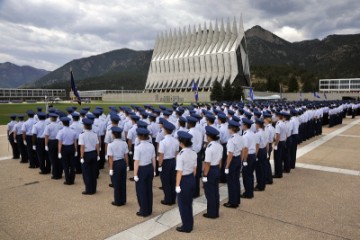Air Force Academy defends use of student informants – Colorado Springs Gazette

The Air Force Academy stood by its use of confidential student informants Tuesday, noting that it’s a practice used across the Air Force that provides what it calls “vital information about criminal activities.”
The academy’s response was in reaction to a Sunday Gazette report about the system of cadet informants who are instructed to deceive classmates, professors and commanders. The academy on Tuesday also questioned the reliability of cadet informant Eric Thomas, who helped bring the Air Force’s Office of Special Investigations to light after he was expelled from the academy, despite being promised protection by his handlers.
Honor and Deception: A secretive Air Force program recruits academy students to inform on fellow cadets and disavows them afterward
“The program uses people who confidentially provide vital information about criminal activities that would not otherwise be available,” the academy said in a statement. “AFOSI uses that information to initiate or resolve criminal investigations. This is an Air Force-wide program and is not something unique at the Air Force’s Academy.”
The Gazette report detailed how the Air Force uses the informant program to go after drug use, sexual assault and other misconduct among cadets. Informants are recruited through long interrogations, then sent to gather evidence, snapping photos, wearing recording devices and filing secret reports.
Thomas, who was the focus of the article, was expelled after getting in trouble for misconduct he said was directed by OSI.
In its own statement, OSI said “The AFOSI confidential informant program is an important and time-proven investigative tool.”
See a complete report in Wednesday’s Gazette and on gazette.com.
Click here to view a replay of Tuesday’s Dave Philipps web chat about “Honor and Deception”
The Air Force Academy stood by its use of confidential student informants Tuesday, noting that it’s a practice used across the Air Force that provides what it calls “vital information about criminal activities.”
The academy’s response was in reaction to a Sunday Gazette report about the system of cadet informants who are instructed to deceive classmates, professors and commanders. The academy on Tuesday also questioned the reliability of cadet informant Eric Thomas, who helped bring the Air Force’s Office of Special Investigations to light after he was expelled from the academy, despite being promised protection by his handlers.
Honor and Deception: A secretive Air Force program recruits academy students to inform on fellow cadets and disavows them afterward
“The program uses people who confidentially provide vital information about criminal activities that would not otherwise be available,” the academy said in a statement. “AFOSI uses that information to initiate or resolve criminal investigations. This is an Air Force-wide program and is not something unique at the Air Force’s Academy.”
The Gazette report detailed how the Air Force uses the informant program to go after drug use, sexual assault and other misconduct among cadets. Informants are recruited through long interrogations, then sent to gather evidence, snapping photos, wearing recording devices and filing secret reports.
Thomas, who was the focus of the article, was expelled after getting in trouble for misconduct he said was directed by OSI.
In its own statement, OSI said “The AFOSI confidential informant program is an important and time-proven investigative tool.”
See a complete report in Wednesday’s Gazette and on gazette.com.
Click here to view a replay of Tuesday’s Dave Philipps web chat about “Honor and Deception”
Read more at http://gazette.com/air-force-academy-defends-use-of-student-informants/article/1510415#CF8z12UkvFRJkoTa.99









